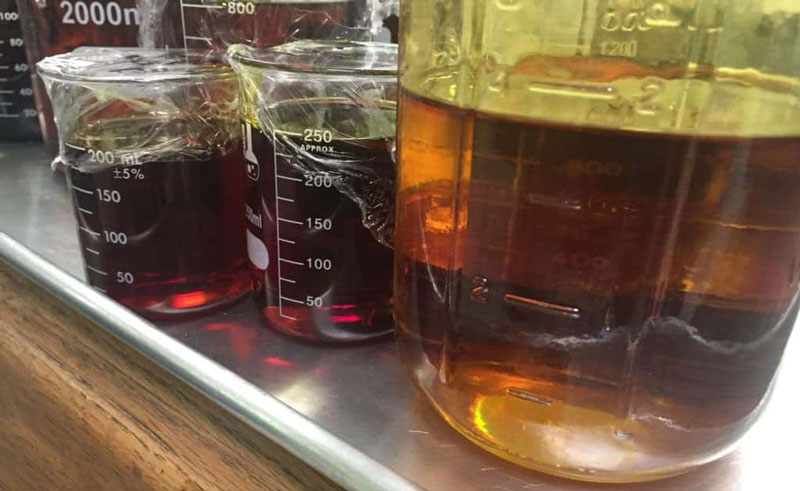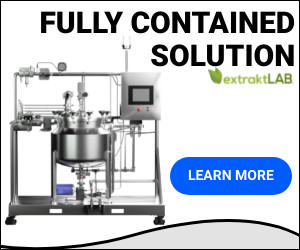THC Extraction
While CBD has exploded in popularity within recent years, Tetrahydrocannabinol (THC) remains the staple cannabinoid in the hemp plant. Though years of controversy and legal precedence has surrounded THC for decades, its medicinal applications and newfound recreational use in legalized states ensures that this cannabinoid is going nowhere – which means THC extraction is critical for profitable hemp businesses.
As the future of hemp accelerates forward, extraction becomes increasingly more popular in the hemp and hemp industry. With THC extract products ranging in potency from 75%-99%, practicing THC extraction methods are important for creating popular products that customers will seek out in the current market. As a producer in legal hemp jurisdictions, nailing down THC extraction is very important, and we would like to show you how.
Introduction to THC Extraction
When talking about extraction in the hemp and hemp industry, it’s important to understand the basics. In terms of THC extraction, the psychoactive compound has to be removed from the plant biomass in order to be purified and formulated into high purity THC products. There are various THC extraction methods available to accomplish this, but all of them serve the same overall purpose of stripping THC from its source and creating products from it.
Most commonly, a form of solvent is introduced to ground hemp biomass which will strip a variety of plant components from the material. The mixture of solvent and plant components then needs to go through a number of processes in order to remove the solvent as completely as possible from the desired THC and other organic compounds. After a final process of distillation, a highly pure, highly potent form of THC is left for product formulation.
Now that we have touched briefly on the process itself, let’s explore THC extraction in detail
How to Extract Pure THC
There are a wide array of ways to extract THC from the hemp plant that result in a plethora of THC products:
- Solvent extracts: Using one of the above mentioned THC extraction methods, solvent extracts are made often on a large scale in facilities designed for high throughput on a commercial scale. These extracts are very similar in composition, but may differ slightly in their potency and residual contents depending on the solvent used.
- Rick Simpson Oil: Commonly referred to as RSO, this extract is commonly made in smaller settings using food grade ethanol to soak the entirety of the marijuana flower to create a dark, potent oil intended for ingestion. Simple and potent, it is now a common extract used for medicinal purposes in very painful or debilitating diseases.
- Kief/Hash: One of the most simple extracts, “kief” is the result of trichomes that are sifted through a mesh screen – often in the bottom of a grinder. This powdery substance is relatively potent compared to the flower of the plant, but is not quite as potent as other extracts. Hash is created in roughly the same manner, but often on a larger scale. The sifted material is then heated and pressed to make a solid brick that can be smoked whole or broken up and added to flower.
- Rosin: Gaining in popularity, rosin is created without a solvent, but yields very similar results to that of some solvent extracts. A heated press is used to crush the marijuana flower to create a tacky, translucent extract without changing the chemical composition as solvent extractions do.

THC Extraction Methods
When it comes to THC extraction methods using common solvents, there are a few that are prevalent in the hemp industry. However, all are not created equally and some may contain their own potential risks for both producers and consumers alike:
Hydrocarbon
Extractions using hydrocarbons are effective, but not 100% safe in production or consumption. Common solvents in this category are hexane, propane and butane – all of which are extremely flammable and cannot be considered organic solvents. This drastically increases risk for fire hazards. For consumers it is not guaranteed that all of the solvent will be removed from a product even through the distillation process. Though the remaining solvents would be minimal, little research has been conducted that daily use of these products is entirely safe.
Ethanol
Ethanol is a very effective method for extracting cannabinoids but can be possibly detrimental for the end user. Organic solvents like food grade ethanol is a relatively safe option but it is often too expensive for a profitable extraction business. Because of this, extractors often turn to denatured ethanol which contains chemical denaturants used to deter recreational consumption. Despite denatured ethanol being created to prevent human consumption, it is still used in hemp extraction. In fact, the FDA allows for certain Parts Per Million (PPM) of pentane, methanol, hexane and other denaturants in extracts that are still considered “safe” for consumption.
CO2
CO2 is the safest, and most efficient extraction method with the lowest long-term costs for manufacturing. In its supercritical state, CO2 is converted to a liquid. It is important that the CO2 is a liquid in order to mix with the raw materials in order to strip the desired compounds during extraction. While ethanol and butane are not organic solvents, liquid CO2 is natural which also allows for obtaining organic certification and reduces harmful emissions that are harmful to the environment. There are no chemical denaturants or residuals left in a CO2 extraction process making it safe for human regular human consumption without any question for concern.
Each of these THC extraction methods are suitable for a quality extract, but it is clear that some pose more of a risk when compared to supercritical CO2 extraction. For that reason, extraktLAB chooses CO2 as the best THC extraction method for customers in legal jurisdictions for THC extraction and provide the highest quality extraction machines in the hemp extraction industry.
UPGRADE YOUR THC EXTRACTION MACHINE
Ask our industrial hemp experts to determine what type of hemp processing and hemp extraction equipment is best suited for your business.
THC Extraction Machines
There are a number of THC extraction machines available on the market, many of which are reputable, safe, and efficient. While some are tailored specifically to the aforementioned THC extraction methods above, others can use a number of solvents in order to achieve an efficient extraction. At extraktLAB, we stand behind the science of supercritical CO2 extractors due to their selectivity, throughput capacity, and long-term profitability.
Supercritical CO2 extractors use carbon dioxide (CO2) at an elevated temperature and pressure to extract soluble compounds like THC from the hemp biomass. Carbon dioxide above the critical temperature (31ºC) and pressure (1071 psi) becomes a supercritical fluid, which has an increased capacity for diffusion of molecules and solubilizing non-polar compounds. Raising the temperature and pressure of the liquid CO2 even further provides highly efficient extractions of oils in a short period of time.
The (ScCO2) extraction has become the preferred method for extracting THC and CBD oils to serve markets with the most demanding standards for safety, quality, purity and consistency. It is also preferred by consumers for the same reasons, and progressive brands are boldly stating “ScCO2 extraction” on package labels.
THC Safety Concerns and Recommendations
As with anything, cautious moderation is often key to the safe use of nearly any product on the market. The same can be said of THC. Because THC extraction methods create a highly potent product – up to 5X the potency of regular flower – using THC extract products can be detrimental to some who may be sensitive to the compound. As a consumer, it is very important to use only a small amount initially of any THC extract to be certain it is not too potent for the individual. For producers, it may be beneficial to indicate the potency of an extract including a warning label and/or a percent of THC label on the product packaging.
Because THC is psychoactive, it cannot be recommended for everyone and may cause more harm than good for some. Studies have shown that regular use of THC for individuals prone to psychiatric disorders, or adolescents can result in psychosis, or other underlying psychiatric disorders to come forward. For this reason, it is very important that users gauge their own personality and potential for risk when using THC extract products of any kind.
In terms of production of THC extracts, our recommendation is to stick to the tried and true, safe, quality THC extraction method: supercritical CO2 extraction. Lacking the risk of flammability of combustibility, it remains the safest option for large scale extraction and remains the best possible option for safe product formulation for customers.
Calculate Your Extraction Business Operating Cost
Starting a Extraction Business? Check out our Calculators and to analyse costs, estimated revenue, yield, initial investments and important metrics for your extraction business.
What is the solvent loss for ethanol extraction?
Hemp and cannabis biomass is an extremely absorbent material. As a consequence, a large amount of solvent volume must be added to the biomass to first solvate the biomass and then fluidize it. For ethanol extraction, approximately one gallon of ethanol is required to extract 1 lb of hemp. Solvent loss comes from the incomplete recovery of that solvent from the hemp.
The following table details the estimated solvent loss from ethanol extraction as a function of volume of hemp processed:
| Lbs processed per day | Daily requirement of
ethanol (gallons) |
Daily Loss of ethanol (gallons) at 90% recovery of ethanol | Max Cost of Solvent Loss per day:
$16-30/gal food grade ethanol $6-8/ gal denatured Calculated at $30/gal |
| 500 | 500-1500 | 50-150 | $1,500-45,000 |
| 1000 | 1000-3000 | 100-300 | $3,000-9,000 |
| 2000 | 2000-6000 | 200-600 | $6000-18,000 |
| 10000 | 10000-30000 | 1000-3000 | $30,000-90,000 |
Another source of solvent loss is incomplete recovery of solvent from the CBD hemp oil.
How many times can I recycle or reuse ethanol from an ethanol extractor?
In guidance published by the FDA in 2010, plans for the reuse of solvents must be accompanied by a Declaration of the maximum number of times the solvent can be reused.
the FDA has recognized that contaminants buildup in the solvent over time as they are recovered and reused
As a consequence, the FDA guidelines recommend that the solvents be brought back to a suitable state before Reuse. A suitable reuse is defined by the original specifications for the solvent that is being used.
In keeping with a risk-based approach to process validation, the key risk to address with solvent reuse is cross-contamination. Cross-contamination could happen when a solvent dissolves a low level contaminant from the biomass being extracted. As the solvent is removed, the contaminant can become magnified and concentrated in either the oil or the solvent during solvent recovery. Cross contamination then occurs when a contaminated solvent is used to extract a non contaminated batch.
Contaminants are typically identified during incoming inspection but may show up later during processing as the oil becomes more refined. Hemp is typically sampled at receiving by quality assurance and a series of tests are conducted on the Hemp biomass in order to determine if the incoming material is contaminated with pesticides, solvents, heavy metals or if it has significant microbial content. Contaminants that are identified in the quality inspection should be tested for build up in the extraction solvent during validation.
Other sources for contamination include carbon black or activated carbon that is typically used in ethanol extraction to remove chlorophyll from the ethanol. Combustion byproducts that are incorporated into the structure of carbon black can dissolve in the ethanol and contaminate.
According to FDA guidelines, the number of times ethanol solvent can be reused must be validated according to a validation protocol. Once the method and process has been validated, the requirements for testing each reuse batch may not be required depending on the risks identified during the validation study.
As a general rule of thumb, a solvent may be reused successfully 20-50 times. Whatever your company’s current practice is, it is important to define the process, validate the process, establish specifications for reuse, and also set up a testing program to measure for contaminants. In all likelihood, a solvent changeover is probably in your future and it’s cost should not be neglected in your overall operating cost model. It is easy to estimate the cost of solving change over as it is the same as the start-up cost:
| Lbs processed per day | Daily requirement of
ethanol (gallons) |
Cost per gallon:
$16-30/gal food grade $6-8/ gal denatured Calculated at $30/gal |
| 500 | 500-1500 | $15,000-45,000 |
| 1000 | 1000-3000 | $30,000-90,000 |
| 2000 | 2000-6000 | $60,000-180,000 |
| 10000 | 10000-30000 | $300,000-900,000 |
The solvent changeover cost on a 60 day change over cycle can then be estimated on a per year basis according to the following table:
| Lbs processed per day | Change Over Frequency | Cost of Changeover | Max Annual Cost |
| 500 | 60 days | $15,000-45,000 | $270,000 |
| 1000 | 60 days | $30,000-90,000 | $540,000 |
| 2000 | 60 days | $60,000-180,000 | $1,080,000 |
| 10000 | 60 days | $300,000-900,000 | $5,400,000 |
By extension, the solvent testing costs will also be important to address:
| Lbs processed per day | Change Over Frequency | Cost of Testing
(pesticides, solvents), Unknowns testing can be 5-10k USD per unknown. |
Max Annual Cost |
| 500 | 60 days | $200-400 | $2400 |
| 1000 | 60 days | $200-400 | $2400 |
| 2000 | 60 days | $200-400 | $2400 |
| 10000 | 60 days | $200-400 | $2400 |
It is important to insist that unknowns be flagged by your laboratory.
What is supercritical CO2 extraction?
Supercritical CO2 extraction is used in hemp processing in hemp extraction for extracting CBD oil from hemp biomass. You can also be used to extract any Botanical oil from any plant material.
The co2 extraction typically takes place above the supercritical pressure and temperature for CO2. Is 1,070 PSI and 31 degrees Celsius.
Under supercritical conditions, the CO2 behaves much like hexane in terms of its solubility selectivity.
Does ethanol extraction have a greater throughput than CO2 extraction?
Hemp processing equipment can be scaled for 1 to 5 tons of extracted hemp per day. It’s generally not a fair comparison to compare the throughput on an instrument from two different companies. What is fair is to specify the throughput At the tonnage process per day and then look at the operating cost for that process. You can also look at the equipment and Facilities cost to accommodate that level of Production. after you have all of your costs accounted for including the hidden costs, then you can calculate the net present value for each investment.
How much hemp can be processed per day with CO2 extraction?
CO2 extraction facilities have been scaled to do hundreds of tons per day of biomass extractions. These facilities are very safe compared to the equivalent extraction facilities that use Flammable solvents.
In Terms of extraction facilities for processing hemp, we have built facilities that will process 5 tons of hemp biomass per day in a safe, low cost, low energy, small footprint operation.
Does it cost less to process hemp with Co2 compared with Ethanol?
Yes.
In fact the operating cost for CO2 extraction is dramatically less than the operating costs associated with ethanol.
Extraction with Ethanol is a process that is typically run at low temperatures. First the ethanol is cooled to below -20oC before it is introduced to the hemp. Cooling the ethanol reduces the amount of extracted chlorophyll and waxes. If you account for the energy required to chill the ethanol down to those low temperatures and then also evaporate after use, the energy bill for extracting ethanol is approximately 3-6x the cost of extracting with CO2. However, the energy cost is really not the key driver in the overall operating costs.
Ethanol extraction requires a significant amount of ethanol to be used per pound of hemp. In fact, about 1 to 1.5 gallons of ethanol must be used per pound of dry hemp in order to extract. Hemp is a very absorbent biomass material and the ethanol must fully saturate the hemp plant before any extraction can take place. For this reason a large volume of ethanol is needed to extract cbd from hemp.
The key cost driver or ethanol extraction is recovery of that solvent from the biomass. Even though many ethanol extraction equipment companies provide centrifuges and or presses to eliminate the amount of ethanol left over in the biomass, The best equipment will provide only a 90 to 95% recovery of the ethanol. This 5 to 10% loss in ethanol is a huge cost driver for extracting ethanol.
For example, suppose you wanted to process 1000 lb of hemp. You would need 1000 gallons of ethanol to start out at a cost of $16-33 per gallon for food grade ethanol for a total cost of $16,000 to $33,000. If you recovered 90% of the ethanol the ethanol loss would be $1,600 – $3,300 per 1000 lbs. Furthermore if you process 1000 pounds per day, this would be your daily loss.
In contrast, you will lose the equivalent of about $70 per day for CO2 extractions for the exact same process.
Besides energy and solvent usage, there are many other hidden costs related to extraction with ethanol including solvent reuse costs, insurance cost, increased facilities cost, and testing costs.
What is the highest yield you can expect from hemp extraction?
Industrial Hemp extraction typically has a CBD content of 5 to 15% by weight. The THC content of the Industrial Hemp is required by law to be less than 0.3% by weight in the flower that is sold.
Does raw hemp moisture affect yield?
Yes, moisture content will affect weight yield. For example, if 10% of the hemp To be extracted was water, and that water was removed during CO2 extraction, the denominator would be larger in the yield calculation, thereby giving a smaller yield number. By extension, if the same hemp was extracted but had zero water in the hemp, the overall weight percent yield of the extract would be a greater percent of the weight.
One thing to note is that in ethanol extraction, water that is in the hemp will dissolve into the ethanol. If the ethanol is removed from the CBD oil with a falling film evaporator, some of the water will be Co evaporated with the ethanol, thereby increasing the amount of water in the ethanol for each extraction cycle. Some of the water will stay in the extract and is typically removed in a secondary stirred reactor before wiped film evaporator and distillation.
Do you offer training on hemp processing and hemp extraction?
We Have taught hundreds of customers how to extract CBD oils from hemp and THC oils from cannabis. Our training package typically includes installation of the equipment, standard operating procedures, commissioning of the equipment in the facility, and training of operators on the procedures that are provided.
We also offer advanced training and quality management system implementation services for those companies who wish to achieve GMP certification.This training dresses all aspects of the quality management system, laboratory information management, batch record system, and Manufacturing execution.
What kind of employees do you need for hemp processing or hemp extraction?
There are basically four different employees that you need to have in order to run a hemp processing or hemp extraction facility. These are as follows:
- assurance
- Shift manager
- Operators
- Optionally analytical operators.
If your goal is to produce a quality product that complies with GMP requirements, you are going to need to have staff that can help you comply with those requirements.That typically means you need to have a quality assurance manager that is aware of the requirements And can Implement those requirements in your facility.
It is also necessary that you have a shift manager. This is someone who is organized and can schedule operators at each station and track the production output. This person will also ensure that operator training has occurred, ensure that yields are met, and also manage the workforce. They are also responsible for producing products that can form with the quality requirements of the end product.
Operators typically execute on the production plan by following standard operating procedures. They are typically trained on how to use the equipment and how to move materials in and out of the process. It is their job to record the data for the quality management system. The Operators typically will be successful if they are Hands-On and are able to follow instructions. It is also a big Advantage if the operator can conduct basic maintenance on the equipment. This requires someone who is Hands-On and has the physical strength to do simple maintenance tasks. This is important for the proper running in the efficiency of a hemp processing facility.
Last but not least, analytical operators or quality control technicians are important for providing yield and in-process testing to the manufacturing facility. They will work with quality assurance directly to ensure that incoming raw hemp biomass conforms to purchasing specifications and to Quality specifications. Quality control technicians are typically chemists and have a laboratory background.



